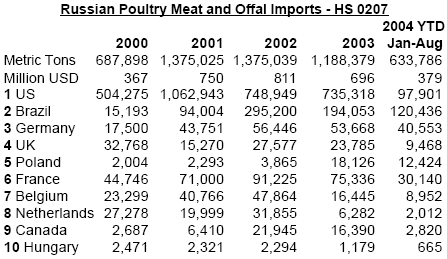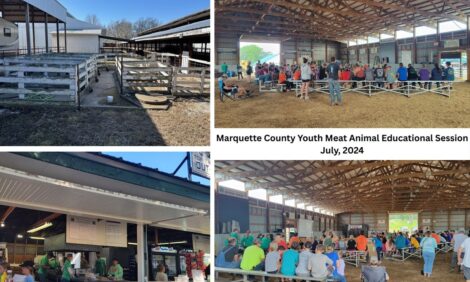



International Egg and Poultry Review
By the USDA's Agricultural Marketing Service - This is a weekly report looking at international developments concerning the poultry industry, this week looking at the expansion of the EU.
Russia
Russia established a quota system in 2003 to restrict poultry, beef and
pork imports to protect domestic livestock breeders. The U.S. and the
EU might not be able to completely fill their quotas for 2004. The
distribution of TRQ licenses for 2004 were delayed, several U.S. plants
were delisted in 2004, and some EU exports were delayed due to a reinspection
of new EU member plants in the late summer. As broiler
meat prices rose due to tighter supplies, buyers switched to lower
quality spent hens or cheaper turkey meat.
Russian Finance Minister Alexey Kudrin said inflation, projected to
increase 10 percent, will rise over 11.5 percent in 2004 due to high
prices for meat, grain and oil. The rise in meat and poultry prices
contributed 1.2 percent to inflation in 2004.

The issuance of implementing regulations for the 2005 poultry quota
have been delayed, slowing poultry imports for the second straight
year. Although press reports have suggested that Prime Minister
Fradkov is close to signing the implementing resolutions, the
documents had not been published as of December 30, 2004. Even if
these resolutions had been passed before the New Year holidays,
normal levels of trade could not resume until February 2005. For 2005
imports to begin, the Russian Government must issue two legislative
measures for each commodity: an implementing resolution and an
importer list. Despite importer list problems in 2004, Russia issued
some provisionary import licenses in January and February. Exports
were one-third to half of normal monthly trade for the first three months
in 2004.
Broiler meat imports in are forecast to decrease by 7 percent in 2005 if
legislative problems continue. Poultry meat supplies are expected to
total 2,250,000 metric tons in 2004; 1,200,000 MT in domestic meat
and 1,050,000 in imported meat. Russian broiler meat supplies are
forecast to grow 13 percent in 2005 due to continued investment in the
sector, high demand and high domestic prices.
Source: USDA/FAS, The Central Bank of the Russian Federation,
Resolution of the Russian Federation Government #880, news wires
Newcastle Disease
Bulgaria Disease (ND) was confirmed in unvaccinated backyard poultry
on December 20, 2004. The previous ND outbreak was in January
1993. The mountainous area does not have any commercial farms. All
poultry in the immediate area were culled and ring vaccination was
started in the area.
Japan ND was confirmed on December 27, 2004 on a commercial
farm in the southern part of Japan. The last outbreak in Japan was in
September, 2002. Commercial farms within a 3-km radius of the
infected farm and the breeding farm where the infected chickens were
hatched, were inspected. Chickens which are infected or suspected of
being infected will be destroyed.
Greece An outbreak of ND was reported on January 7, 2005. The
outbreak affected one poultry farm with 20,500 free range broilers. The
only other farm in the area, with 3,000 broilers, did not show any signs
of the disease. The last outbreak in Greece was reported to the OIE in
September 1986. The Greek Veterinary Services took actions to
implement stamping out measures, according to the provisions of the
European Council Directive 92/66/EEC.
Source: OIE Animal Health Information Department information
To view the full report, including tables please click here (PDF Format)
Source: USDA's Agricultural Marketing Service - 11th January 2005








